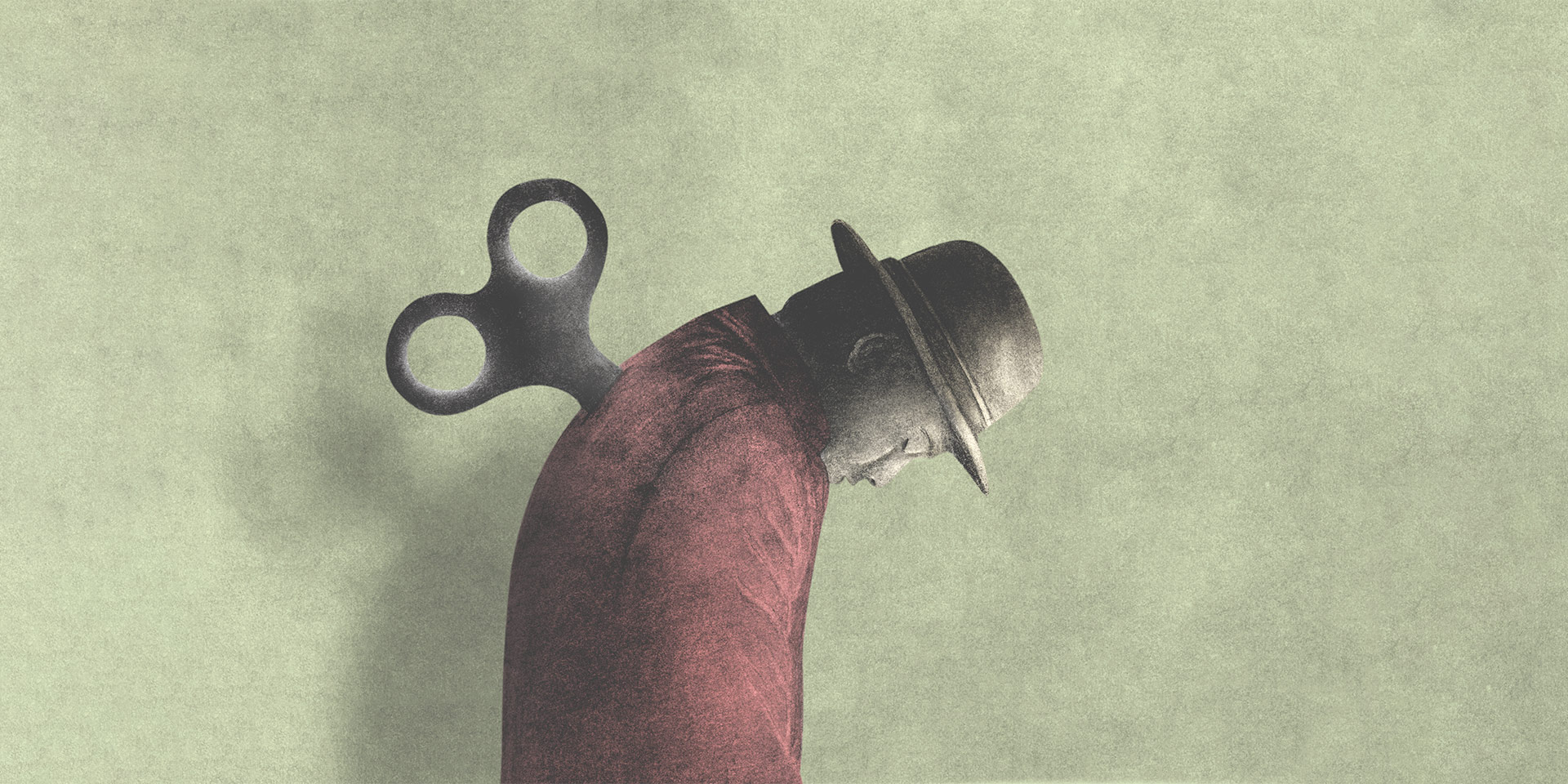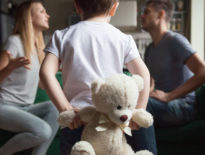Everyone thinks forgiveness is a lovely idea until he has something to forgive. – C.S. Lewis
Pascale Kavanagh’s childhood years were a veritable drama, and they continued to affect her even as an adult. Having been raised in an abusive family, Pascale’s mother brought this baggage into the family she later formed.
“She would hit me and my younger brother, fling plates in our direction, and call us names. My father tried to get between her and us, and she wouldn’t spare him, either,” Pascale recalls. Both of Pascale’s parents were very good doctors. But there was a huge gap between their professional and family lives.
Her mother’s contempt followed Kavanagh throughout her childhood and adolescence—nothing was too insignificant to be ridiculed, from her physical appearance to her academics and social life. In college, her mother would call her every week, just to accuse and reprimand her. When Pascale’s daughter was born, the young woman hoped she and her mother would bury the hatchet, but as the child started to grow, so did the grandmother’s anger.
At 73 years old, Pascale’s mother suffered a stroke, and her daughter was her only living relative who could take care of her. “At first I was angry. I felt she had left a mess that I had to take care of,” Pascale said. However, she decided to spend time with her, reading or talking to her, although she did not know whether her mother understood anything she was saying. During the following months, Pascale’s anger and hatred began to melt imperceptibly, until, one day, she felt the need to lay her head down in her mother’s lap. “For the first time, I stopped condemning her. And that gave me peace,” Pascale says. When she let go of the feelings of bitterness that troubled her, Pascale discovered something essential about forgiveness: “I see now that forgiveness is not so much about what you receive from people, but what you give them.”
Redefining forgiveness
Even if forgiveness is about the mistakes others have made, the act itself is intimately connected to our own healing and liberation. “We don’t forgive to help the other person. We don’t forgive for others. We forgive for ourselves,” said Nobel Peace Prize winner Desmond Tutu, a South African Anglican archbishop known for his work as an activist against apartheid.
“Forgiving a person who has wronged you is never easy, but dwelling on those events and reliving them over and over can fill your mind with negative thoughts and suppressed anger. Yet, when you learn to forgive, you are no longer trapped by the past actions of others and can finally feel free,” Tyler VanderWeele says.
Forgiveness is a process of removing negative feelings. During this process “people uncover how they are feeling and thinking, they realize that they no longer want…the hurt or pain to control their life,” says Susan Stuntzner, the director of disability support services and a retention specialist at Southwestern Oregon Community College.
The choice to forgive is a shortcut to freedom, declares professor Tyler VanderWeele from Harvard University. “Forgiving a person who has wronged you is never easy, but dwelling on those events and reliving them over and over can fill your mind with negative thoughts and suppressed anger. Yet, when you learn to forgive, you are no longer trapped by the past actions of others and can finally feel free,” the professor says.
The biblical model presents “transactional” forgiveness, says professor Lourdes Morales-Gudmundsson in a book which looks at forgiveness from a psychological and theological point of view. This model of forgiveness implies a few steps: first, recognising the evil suffered by the affected person; second, clarifying the reasons behind the evil that was suffered as well as its very nature; third, repenting and asking for forgiveness; fourth, claiming damages in court, where this is possible; and fifth, forgiving the guilty person, regardless of whether or not he has asked for forgiveness.
VanderWeele says there are two stages of forgiveness: decisional and emotional. The first stage implies replacing resentment with benevolence. “You no longer wish bad things to happen to that individual,” VanderWeele says. Emotional forgiveness is harder, says the professor, because negative emotions can easily resurface when an incident activates the memories of the offence, or when you are forced to endure the effects of the offence in the long run.
Although a confession and an expression of regret by the wrongdoer makes the process of forgiveness easier, these should not necessarily be considered prerequisites for forgiveness, says Desmond Tutu: “If the victim could forgive only when the culprit confessed, then the victim would be locked into the culprit’s whim, locked into victimhood, whatever her own attitude or intention. That would be palpably unjust.”
What forgiveness is not
The concept of forgiveness can become so elastic as to incorporate very distorted ideas, according to the International Forgiveness Institute, founded by a team of professors at the University in Wisconsin, Madison. This group has studied and worked to dismantle many of the myths about forgiveness.
Forgiveness does not mean finding excuses
Even if we admit that no one is perfect, forgiveness is not the same as finding excuses for the wrongdoer’s behaviour. Finding excuses for the one who hurt us can be a selfish act rather than a loving one. If what we hide behind those excuses is in fact our lazy choice to not deal with the guilty person, and our hope that others will confront him, or that time will dull the resentment, then we are choosing an illusion of comfort over true release from pain, according to Morales-Gudmundsson.
Forgiveness does not mean pretending nothing bad has happened
Often, the culprit refuses to admit the damage they have done, either out of shame or out of fear of being confronted with the truth of their actions. When we forgive, the incident that hurt us does not simply disappear from our minds—we only learn to look at it from a different perspective. This does not mean that we will call evil good. We will continue to believe injustice is, and will always be, wrong. But we will also make peace with ourselves and we will learn to free ourselves from the pain that drowns our memories.
Restoring the relationship to its original state
Professor Trudy Govier distinguishes between bilateral and unilateral forgiveness. In the case of bilateral forgiveness, the culprit confesses their fault and is forgiven. The relationship is restored, or at the very least this possibility exists, because both parties have reached an agreement. When it comes to unilateral forgiveness, reconciliation is only possible if the culprit confesses the harm they have done and proves their regret through material or behavioural compensation.
Reconciliation is not possible or desirable in every situation because “…we’re commanded by scripture to forgive others, love others, and be kind to others; however, nowhere in the Scriptures are we commanded to be friends with everyone,” says Shane Pruitt, director of evangelism for the Southern Baptists of Texas Convention. Sometimes forgiveness implies keeping one’s distance, because some relationships can be “dangerous, harmful or even toxic”.
Authentic forgiveness does not hold the culprit hostage
Many victims choose not to forgive because their unforgiving attitude gives them a feeling of power they do not want to give up. Still, those who decide to forgive do not really forgive if they place the culprit in a continuous state of moral inferiority, thinking their wrongdoer will always be indebted to them. This attitude can backfire on the one who “forgives” in this way, Morales-Gudmundsson says.
Why is it hard for us to forgive?
The way in which we forgive has to do with the example we were shown by our family, says therapist Laura Breman. In an article that addresses forgiveness in general, and forgiving an unfaithful partner in particular, Breman says that if one’s family members growing up tended to remain hostile for a long time, one can end up adopting the same relational pattern. Unforgiveness can also stem from not taking full responsibility for our lives and relationships, Berman says. She explains that while nobody deserves to be treated badly, every adult contributes, even if in small measure, to the deterioration of a relationship, or to triggering a conflict. Becoming aware of this is the first step to extending forgiveness, the therapist concludes.
Our difficulty to forgive has to do with our belief that the world should be just and that we should be treated with dignity, even in a situation where we err, psychotherapist Fred Luskin says.
We find it difficult to forgive because we take comfort in self-pity, an article in Christian Today shows. It seems more difficult for us to confront the one who wronged us according to the extent and effects of their wrongdoing. We would rather give in to anger, consternation, and self-victimisation. On the other hand, when we forgive we are forced to end our efforts to draw empathy or to convince others of the wickedness of those who have wronged us.
Taking a closer look at this general perspective on life, Luskin identifies three reasons why we sometimes refuse to forgive: (1) we do not compare the offence we have suffered with the sufferings of other people in even more hostile circumstances, (2) we do not understand that the responsibility for the management of our feelings is exclusively ours, and (3), we create a narrative full of rancour. After we have been hurt, we build a narrative that we are unwilling to change, and which gives us exclusive rights to victimhood. Disseminating this narrative strengthens negative feelings, blocking the road to forgiveness.
“I am sorry” must be the three hardest words to utter in any language, Desmond Tutu says. The second place must surely be claimed by the words, “I forgive you”. Regardless of the extent of the loss, forgiveness remains the only solution, at least if the studies showing the major physical and mental benefits of forgiveness are to be believed.
The benefits of forgiveness
Forgiveness is always a winning card, even if we look at it exclusively through the lens of the health benefits it brings.
Those who practice conditional forgiveness (they forgive only if the culprit asks for forgiveness or promises he will not repeat the mistake) have a higher mortality rate than those who simply forgive, a 2011 study conducted by a researcher from the Luther College showed.
A study published in the journal Personal Relationships, which analysed married couples, showed that whenever someone decided to forgive their spouse when they had offended them, the blood pressure of both spouses decreased. Furthermore, those whose spouses have a conciliatory attitude experience greater decreases in blood pressure than those whose partners are less willing to forgive.
“Forgiveness may produce beneficial effects directly by reducing allostatic load associated with betrayal and conflict, and indirectly through reductions in perceived stress,” concluded the authors of a 2003 study which showed the correlation between forgiveness and a drop in blood pressure.
Researchers from Hope College have conducted a study using a group of 70 students who were asked to recall situations in which they either chose to forgive, or they felt enmity towards someone who had wronged them. Subjects reported feeling more depressed when recalling transgressions they had not forgiven, and the researchers found that reliving those situations caused an increase in the heart rate, blood pressure, sweating, and muscular tension of the volunteers.
Forgiveness can be associated with strengthening one’s immune system for people with HIV. This is the conclusion a group of American researchers reached.
The willingness to forgive has been correlated with a higher percentage of CD4 cells (immune system cells that play a decisive role in the immune system’s fight against external invaders, and which are destroyed by the HIV infection). “There is a special relationship between forgiveness and CD4 cells,” says Amy Owen from the Duke University Medical Center, in Durham, North Carolina.
On the other hand, refusing to forgive generates a state of chronic anxiety, and this has a strong impact on the reproductive, digestive, and immune systems, according to Reverend Michael Barry, responsible for pastoral care at the Cancer Treatment Centers in America, Philadelphia. “There is a direct correlation between unforgiveness and our immune system, which directly affects our healing processes. We teach people what we have learned about the process of forgiveness in a short-term forgiveness intervention program that works,” Barry says.
“If you don’t get past some of the wounds of the past, you tend to bring them into everything else you pursue,” says Fred Luskin. When we do not really forgive, we are more likely to lack confidence and be more sceptical in our relationships, because we have remained enslaved to past events, Luskin says.
An even better reason to forgive
There is a passage in the Bible that we rarely mention and that we do not usually print on T-shirts or mugs, because it isn’t as pleasant to contemplate as some other verses. It draws a strong connection between the way we forgive and the way we ourselves have been forgiven: “For if you forgive other people when they sin against you, your heavenly Father will also forgive you. But if you do not forgive others their sins, your Father will not forgive your sins” (Matthew 6:14-15).
Several biblical texts speak about the Christian’s obligation to forgive. When Peter asks Jesus to give the some kind of limit to the forgiveness we should extend to our fellow men, Jesus raises the bar to a level that is confusing to His disciples: “…seventy times seven” (see Matthew 18:21-22). This answer teaches us that real love does not rigorously keep count of mistakes.
Even if some acts seem unforgivable, the Bible promises that we can do everything through the One who suffered—without protest or resentment—the greatest injustice in the universe.
In His last hours of life, betrayed, deserted by His people, hanging naked between the heavens and the earth, crushed by the burden of the sins of the world, and mocked by the entire people, Jesus prayed for His enemies.
The gospel according to Matthew recounts that, among the group of mockers accompanying Him in His last hours of life, consisting of passers-by, priests and the thieves crucified with Him, one challenge was chanted at Christ over and over again: “Come down from the cross, if you are the Son of God!”
It would have been easy for Him to exercise His divine power, and shrug off the cross as though He were not even nailed there. But, had He freed His hands and feet, the gate of forgiveness—and the gate to life for us—would have shut with a damning bang. Therefore, perhaps the best reason of all to forgive, is to honour His sacrifice.
Carmen Lăiu is a writer for ST Network and Semnele timpului.



















